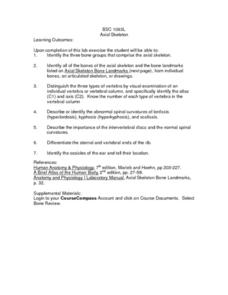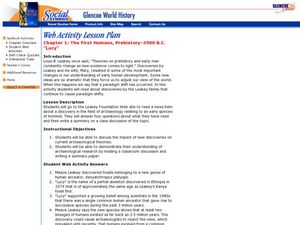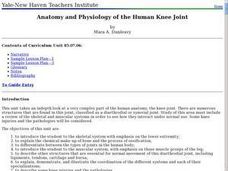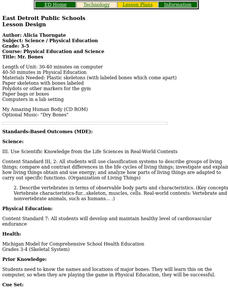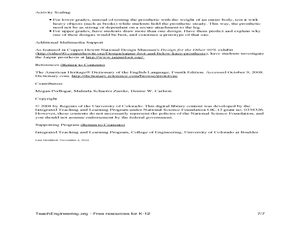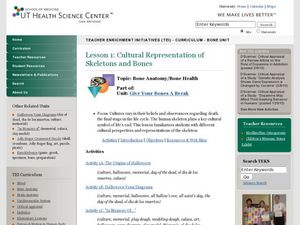Curated OER
DISARTICULATED SKELETON
In this anatomy worksheet, 8th graders cut out the different parts of the skeleton and then put them back together and label it with the help of the example.
Curated OER
Whose Skeleton is in Your Closet?
Students analyze and measure parts of a model skeleton to determine sex, race, height and age. They produce a lab report from their inquiries.
Curated OER
Moving and Growing: Joints
Introduce the three types of joints found in the human body. Hinge, ball and socket, and sliding joints are discussed, examined, and defined in this short, yet informative presentation. There are a few pair-share opportunities suggested...
Early Childhood Learning and Knowlege Center
My Body My Senses
In a comprehensive unit of activities, learners explore the five senses. Youngsters discover the many different body parts and their functions that allow humans to have sense of sight, touch, smell, taste, and hearing. The best way to...
Curated OER
Axial Skeleton and Fetal Skull
In this science worksheet, students identify bone groups from a given list. Students list each bone included in the axial skeleton. Students answer questions about specific bones, their location and importance.
Curated OER
Our Amazing Skeleton
Students study the skeleton, about the number of and types of bones in the body, and how outer space affects astronauts' bones. They discover how to take care of their bones here on Earth to prevent osteoporosis, or, weakening of the...
Curated OER
The First Humans: Prehistory-3500 B.C. "Lucy"
Students explore prehistoric times by completing web activities in class. In this human ancestry lesson, students identify the archaeological discovery of the "Lucy" skeleton and what it meant for science. Students investigate the Leakey...
Curated OER
Label the Skeleton
In this skeleton worksheet, students label 26 bones of the skeletal system including bones in the appendicular skeleton and the axial skeleton.
Curated OER
Anatomy and Physiology of the Human Knee Joint
Students examine human anatomy with a focus on the knee joint. In groups, they research the chemical makeup of human bones and explain the different types of joints found in the body. To end the instructional activity, they identify the...
Curated OER
Life Science: Exploring Our Human Bodies
Young scholars explore the concept of the human body. They complete a variety of activities concerning the function of various organs. They listen to their heartbeat with a stethoscope, examine how muscles work during a game of tag,...
Alabama Learning Exchange
Heads, Shoulders, Knees, and Toes
The identification of various parts of the human body is the focus of this biology lesson plan. Young scientists sing the song "Head, Shoulders, Knees, and Toes," and trace the human body onto butcher paper. Additionally, they label the...
Curated OER
The Skeletal System
In this biology activity, 9th graders study the diagram of the dog shown and label the corresponding bones on the human skeleton. They explain some of the differences in location of the bones as compared to the dog.
California Academy of Science
Human Evolution
As the great and hilarious Tim Minchin once said, "Science is simply the word we use to describe a method of organizing our curiosity." Science is more than just a guess; it is based on questions, observations, and evidence. High...
Curated OER
Protection, Support, and Locomotion
For this human body worksheet, students will review 5 terms associated with the skin by filling in the blank. Then students will read 14 statements about the human skeleton and muscles and determine if its true or false.
Curated OER
Dem Dry Bones Take Form
Students discover human anatomy by dancing with a song in class. In this human body lesson, students listen to the song "Dem Dry Bones" and identify the different parts of a paper human skeleton. Students perform a dance that goes...
Curated OER
Moving and Growing
Students learn to understand the role of both skeletons and exoskeletons. In this lesson on exoskeletons, students locate and label bones on diagram of a human skeleton, and observe and discuss bones of chicken and fish. Students then...
Consortium for Ocean Science Exploration and Engagement (COSEE)
Ocean Acidification: Whats and Hows
Open this instructional activity by demonstrating the production of acidic carbon dioxide gas by activated yeast. Emerging ecologists then experiment with seashells to discover the effect of ocean acidification on shelled marine...
Curated OER
Who Wants to be a Millionaire? Human Body Systems and Plants
Fifteen multiple choice questions review a variety of biology topics. In game-show fashion, viewers answer questions about a plant's needs, the skeletal system, and the cardiovascular system. If you happen to teach these three topics...
Curated OER
Mr. Bones
Students play CD-ROM game My Amazing Human Body, and participate in relay game in Phys. Ed. where they put together skeleton on which body parts are labeled.
Curated OER
Skeletal System
Seventh graders identify and label twenty-five bones of the skeletal system. In small groups they glue various types of dried pasta to a large human body outline. They attach the pasta to the outline and label the pasta bones.
Curated OER
Prosthetic Party
Students examine human anatomy by creating a prosthetic limb. In this medical engineering lesson, students view numerous images of prosthetics used in science today and define several medical terms associated with prosthetics. Students...
Curated OER
Bite on This!
Different types of teeth have different roles. Third graders study how molars, incisors, and canines function in a rabbit skull and a cat skull. After answering some questions about the teeth of herbivores and carnivores, kids...
Curated OER
Cultural Representation of Skeletons and Bones
Eighth graders study cultures and beliefs about the final life cycle. In this culture lesson students complete several activities on the origins of Halloween.
Howard Hughes Medical Institute
Ocean Acidification
Human impacts on the environment can sometimes be difficult to measure, especially under water! An activity centered on ocean acidification gives science scholars the opportunity to examine the effects of carbon dioxide on marine life....






